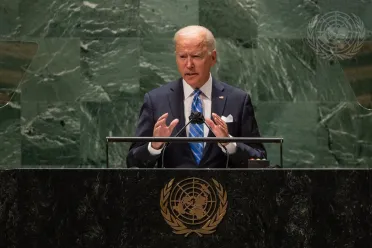Statement
Statement summary
JOSEPH R. BIDEN, President of the United States, said the Assembly meets at a moment of great pain and extraordinary possibility, mourning the more than 4.5 million lives taken by COVID-19, a reminder that a shared future will hinge on the ability to recognize a common humanity and to act together. “This is the clear and urgent choice we face” at the dawn of what must be a decisive decade. He questioned whether nations would work to defeat COVID-19 everywhere or fail to harness the tools at their disposal; whether they would meet the climate challenge or suffer the merciless march of more extreme weather. Would they uphold the human rights under which “nations in common cause” had formed the United Nations, he asked, or allow its core principles be trampled and twisted in pursuit of naked political power. “We stand at an inflection point in history,” he said.
For its part, he said that the United States is devoting resources to end the pandemic, tackle the climate crisis, manage the shifts in global power dynamics, shape the world role on the vital issues of trade, cyber‑ and emerging technologies, and face the threat of terrorism. Having ended 20 years of conflict in Afghanistan, it is opening a new era of “relentless diplomacy”, using its development aid to renew and defend democracy, proving that “Government by and for the people is still the best way to deliver”. During his tenure, the United States has prioritized the rebuilding of alliances, reaffirmed its Article 5 commitment to the North Atlantic Treaty Organization (NATO), and is working with its allies on new strategic concept to tackle future threats. It has renewed its engagement with the European Union, elevated the Quad partnership (with Australia, India and Japan), and is working with the Association of Southeast Asian Nations (ASEAN), the African Union and the Organization of American States (OAS) to foster better health and economic outcomes.
“We are back at the table in international forums, especially at the United Nations,” he said, re‑engaging at the World Health Organization (WHO) and having rejoined the Paris Agreement on climate change. The United States will defend itself and its allies, with force, if necessary, but only with the informed consent of its people, and where possible, in partnership with its allies. He called for the creation of a mechanism to finance global health security and for a global health threat council, armed with tools to monitor and identify emerging pandemics, noting that the United States has provided $15 billion to the global COVID-19 response and shipped more than 160 million vaccine doses. Turning to climate change, he said that to keep global temperature rise to 1.5°C, every nation must bring its highest ambitions to COP26. Citing a new national goal to reduce greenhouse‑gas emissions by 50 to 52 per cent below 2005 levels by 2030, towards achieving net‑zero emissions by 2050, he said his office has doubled public financing to help developing nations address the climate crisis and will work with the United States Congress to double that number again, including for adaptation.
He went on stress that the United States will work to ensure that advances in biocomputing, quantum computing, 5G and artificial intelligence are used to lift people up, rather than suppress dissent or target minority communities. It will pursue new rules for global trade and economic growth, working to level the playing field, and ensure that the benefits of globalization are shared broadly. It will uphold long‑standing rules in place for decades: freedom of navigation, adherence to international law, support for arms control and enhanced transparency. “We are not seeking a new cold war or a world divided into rigid blocs,” he asserted. His country is committed to preventing Iran from gaining a nuclear weapon, he said, and working with the P5+1 to engage Iran diplomatically and return to the Joint Comprehensive Plan of Action, prepared to return to full compliance if Iran does likewise. He expressed support for the denuclearization of the Korean Peninsula. On terrorism, he said those who commit terrorist acts will find a determined enemy in the United States, noting that his country is more resilient in its ability to repel threats than in 2001.
He called corruption “nothing less than a national security threat”, pointing out that people have taken to the streets in every region, demanding that Governments meet their needs and protect their rights. “As leaders it is our duty to answer that call,” he said. He closed by underscoring unequivocal support for an independent Jewish State, pointing to the two-State solution as the best path forward. He drew attention to the Security Council statement outlining support for Afghans and laying out human rights expectations for the Taliban. He condemned the targeting of racial, ethnic and religious minorities, whether in Xinjiang, northern Ethiopia or elsewhere, and called on all to defend the rights of lesbian, gay, bisexual, transgender, queer and intersex communities, including in Chechnya and Cameroon. While authoritarians may seek to proclaim the end of democracy, the truth is that “the democratic world is everywhere”, he said, living in anti-corruption activists, human rights defenders, journalists, peace protesters and those on the front lines in Belarus, “Burma” and Venezuela. It lives in the brave women of Sudan who pushed a genocidal dictator from power, in the proud Moldovans who hope to fight graft and in the young people of Zambia. “This is moment where we must prove ourselves the equals of those who come before us […] who built the United Nations, broke the cycle of war”, and laid foundation for seven decades of relative peace.

